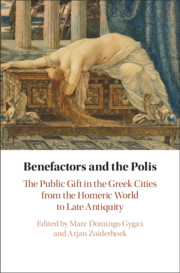 Benefactors and the Polis
Benefactors and the Polis Book contents
- Benefactors and the Polis
- Benefactors and the Polis
- Copyright page
- Contents
- Figures
- Tables
- Contributors
- Acknowledgements
- Abbreviations
- Introduction
- Part I Benefiting the Community in Early Greece
- Chapter 1 Heroic Benefactors?
- Chapter 2 The Garden of Pisistratus
- Part II Classical Benefactors
- Part III Hellenistic Benefactors
- Part IV Benefactors and the Polis under Rome
- Part V The Decline and Fall of Euergetism?
- Conclusion
- Index
- Index locorum
- References
Chapter 2 - The Garden of Pisistratus
Benefactions and Dues in Archaic Athens
from Part I - Benefiting the Community in Early Greece
Published online by Cambridge University Press: 21 January 2021
- Benefactors and the Polis
- Benefactors and the Polis
- Copyright page
- Contents
- Figures
- Tables
- Contributors
- Acknowledgements
- Abbreviations
- Introduction
- Part I Benefiting the Community in Early Greece
- Chapter 1 Heroic Benefactors?
- Chapter 2 The Garden of Pisistratus
- Part II Classical Benefactors
- Part III Hellenistic Benefactors
- Part IV Benefactors and the Polis under Rome
- Part V The Decline and Fall of Euergetism?
- Conclusion
- Index
- Index locorum
- References
Summary
On the one hand, the tyrants of the archaic age are considered to be demophagoi, the ‘eaters’ of common goods; on the other hand, their reign is praised as the Golden Age of Kronos. This chapter deals with the relationship between tyrants and the people and discusses the connection between dues and benefactions. It establishes the notion that the reign of tyrants as well as the reign of succeeding aristocratic houses were rooted in the tradition of Homeric kings. The garden of the Phaeacian king Alcinoos, where the citizens drew their water, symbolizes ideal ruling. Exactly the same kind of benefactions, the securing of the water supplies, has been attributed to the archaic tyrants. The chapter aims to present the lines of tradition as well as the discontinuities in the early Greek conceptions of generosity and dominion.
- Type
- Chapter
- Information
- Benefactors and the PolisThe Public Gift in the Greek Cities from the Homeric World to Late Antiquity, pp. 44 - 66Publisher: Cambridge University PressPrint publication year: 2021
